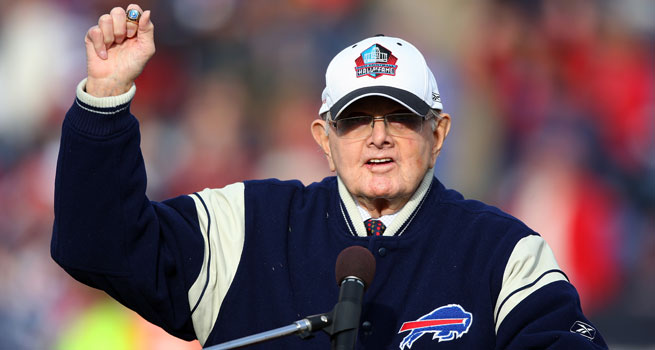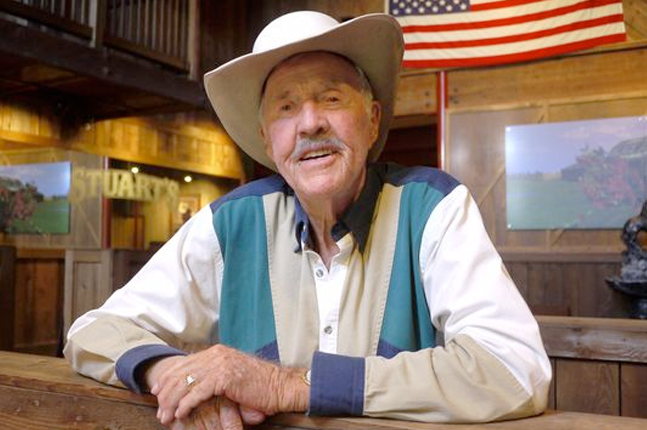Wilson grew up in Detroit, Michigan, graduated from the University of Virginia and attended the University of Michigan Law School. At the university of Virginia he joined the Phi Delta Theta fraternity. He is a World War II veteran and after the war ended, he took over the successful insurance business of his father and invested in Michigan area mines and factories. He eventually purchased several manufacturing outlets, construction firms, and radio stations, and founded Ralph Wilson Industries.
A minority owner of the Detroit Lions, Wilson got wind of Lamar Hunt’s plans for a new league, the American Football League, to challenge the NFL. He tried to put together a team in Miami, but was turned down. His next choice was Buffalo. In September 1959, Wilson sent Hunt a telegram with the words, “Count me in with Buffalo.” He named his new team the Bills, after a previous team that had played in the All-America Football Conference from 1946 to 1949. On October 28, the Buffalo Bills officially became the seventh franchise of the AFL.
Wilson was a pillar of the league, fielding the only AFL team that went to postseason play for four consecutive years, 1963–1966. The Buffalo Bills won the league championship in 1964 and 1965. Wilson made professional football a resounding success in a “small market,” signing such stars as Cookie Gilchrist, Jack Kemp, and Tom Sestak and Hall of Famer Billy Shaw.
He was a guiding force in AFL policies that ensured success, such as gate and television revenue sharing; in 1961, with the rival Oakland Raiders in financial difficulty, Wilson loaned the club $400,000 and also would be willing to loan money to Billy Sullivan of the Patriots. Wilson helped keep those franchises afloat, likely saving the entire league from folding. In November 1963, Wilson lobbied successfully to have American Football League games postponed the Sunday after President John F. Kennedy’s assassination, while NFL games went on uninterrupted.
After the original naming rights deal on the Bills’ current stadium expired in 1998, the facility’s name was changed from Rich Stadium to Ralph Wilson Stadium.
Wilson continues to be one of the league’s most outspoken owners. He was one of only two owners (the Cincinnati Bengals’ Mike Brownhome games in Toronto beginning in 2008, after railing against the Western New York economy, being the other) to oppose the league’s current collective bargaining agreement. He also negotiated a deal to have his team play
Wilson maintains a permanent residence in Grosse Pointe Shores, Michigan with his wife, Mary. He has three daughters, two of whom are involved in team business. Linda Bogdan, Pro Football’s first female scout, is the franchise’s Corporate Vice President, while another daughter, Christy Wilson Hofmann, serves as a consultant in the area of merchandising. He is a 1992 inductee of the Greater Buffalo Sports Hall of Fame.
Pro Football Hall Of Fame
On January 31, 2009, Ralph Wilson was elected to the Pro Football Hall of Fame along with former Buffalo Bills great Bruce Smith. Joining the two legendary Buffalo Bills icons in Canton for enshrinement are defensive back Rod Woodson, offensive lineman Randall McDaniel, wide receiver Bob Hayes, and linebacker Derrick Thomas. Many consider him, along with former Kansas City Chiefs owner Lamar Hunt and current Pittsburgh Steelers owner Dan Rooney to be some of the most instrumental figures in the modern NFL era. The Hall of Fame game, played the day after the 2009 inductions, will stray from the usual AFC-NFC format and instead will be between two original American Football League teams: the Buffalo Bills and the Tennesee Titans (formerly the Houston Oilers). This matchup was announced after Wilson was elected. The Titans’ owner, Bud Adams, is also the only owner his team has ever had, and the two are the only living members of the “Foolish Club”, the founders of the original eight AFL teams. Wilson and Adams are the only two men who have owned a Professional Football franchise continuosly for fifty years. The Hall of Fame game will be a kickoff to the 2009 season, which would have been the 50th season of play for the AFL, if the NFL had not merged with it.





